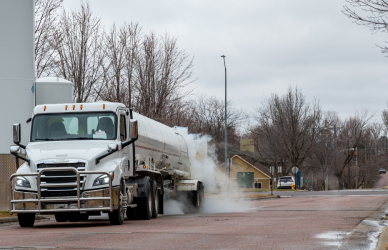During the annual convention of the Truckload Carriers Association (TCA) in Nashville on Monday, March 26, Sue Lawless, Acting Deputy Administrator of the Federal Motor Carrier Safety Administration (FMCSA), addressed several crucial issues pertinent to the trucking industry. These included truck parking, female truck drivers, and workplace safety. Lawless started by commending the industry and its stakeholders.
“You are among the best of the best of safe trucking,” she said. “Every day, you show us what motor carriers can do to keep the country moving, and you do it safely.”
Lawless highlighted the FMCSA’s commitment to achieving zero fatalities on the nation’s roadways, calling out initiatives such as the National Roadway Safety Strategy.
“Zero is an ambitious goal, but we believe it is the only acceptable number,” Lawless said. “Somebody told me … that we will never get to zero — that it’s impossible to get to zero. I disagree. … Just because you can’t see something now, it doesn’t mean that it could not exist in the future.”
She emphasized various strategies that could contribute to this goal, including technological advancements for driver assistance, equipment enhancements, improvements in emergency response, and better access to medical treatment for professional truck drivers.
“All of those things have the potential to make zero deaths a reality in our lifetime, and that’s why partnerships with organizations like TCA, safety advocates, state and local governments, and others are so critical in our mission,” she said.
The National Roadway Safety Strategy recently released a report on the effectiveness of current safety strategies. Lawless expressed concern over persistently high fatality rates on highways. She noted that while U.S. traffic deaths decreased by 3.6% last year, nearly 41,000 individuals lost their lives on the nation’s roads, according to estimates by safety regulators.
“We know that we must do more, and we know that we can’t do it alone,” Lawless said. “It’s great to see over 160 organizations answer the department’s call to action campaign, and we thank TCA for being one of the first partners to answer our call.”
Moving onto the topic of truck parking, Lawless acknowledged strides made since the Bipartisan Infrastructure Law gave federal grant funding for states to expand truck parking spaces.
“Those projects included $180 million to the Florida Department of Transportation for over 900 truck parking spaces, over $92 million to the Missouri Department of Transportation for a project that includes both truck parking and truck parking information systems, and over $22 million to Tennessee for a bridge replacement and additional truck parking,” Lawless said.
Additionally, she highlighted ongoing research projects aimed at improving truck parking availability information systems and analyzing safety data from connected trucks to identify areas with high parking demand.
“We know truck parking remains a safety and overall quality of life issue for drivers, and it remains a priority for us to partner across the industry to help ease and eventually eliminate this challenge,” she said. “We have also launched our driver compensation and driver detention time studies to address other factors that may make it difficult to sustain a career as a truck driver. We know that the longer drivers stay in the industry, the safer they become.”
Lawless also discussed the recent meeting of the Truck Leasing Task Force during the Mid-America Trucking Show, focusing on addressing unfair leasing arrangements and their potential impact on driver and motor carrier safety.
“FMCSA (has a) new registration system (that) will improve the transparency, efficiency, and user experience with the agency’s registration systems and reduce fraud in the registration process,” she said. “This is just one of the steps we’re taking to modernize all FMCSA systems.”
Furthermore, she touched upon the FMCSA’s efforts to modernize systems in light of cybersecurity concerns and ongoing rulemaking efforts, including the heavy-duty automatic emergency braking rule.
“Because we believe that technology has the promise of saving lives, we continue to look for ways to encourage the adoption of technology that can prevent crashes or reduce the impact from crashes that happen, including beyond-compliance initiatives and other ways to encourage carriers and drivers to use technology that improves safety, but most importantly makes sense for them,” Lawless said.
Recognizing persistent factors contributing to crashes, such as distracted driving, speeding, and drug and alcohol use, Lawless emphasized the need for continued vigilance and intervention. She ended by reaffirming the FMCSA’s commitment to maximizing the impact of its grant programs to support the growth and prosperity of the trucking industry.
“Earlier this month, we announced our notes of funding opportunities for 2024,” she said. We have more than $180 million available, including opportunities for CDL and other driver training and programs specifically for veterans who want to become truck drivers. I hope that this has given you some insight into our work at FMCSA. I’m proud of our work and encouraged by our partnership.”
Source: The Trucker











